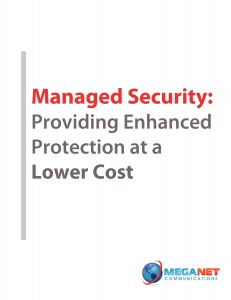Data loss. Security breach. Intrusion attempts. Hacking.
These words can make any business owner, head of IT, or manager shudder with fear. While major websites or retailers being hacked and having their customer data stolen (or shared online) makes the news, in reality businesses of all sizes are being hacked on a daily basis. Companies with less than 100 employees represent over 30% of hacking attempts that result in damages or data loss, and that percentage is expected to continue to grow.
 With nearly every business using a high-speed Internet connection, the proverbial door is almost always open (and often times, it’s unlocked as well). For many smaller businesses, the aspect of data security and strong policies can be a bit daunting, but they don’t need to be. Here are some top ways your small or medium business can prevent intrusions and data loss due to hacking.
With nearly every business using a high-speed Internet connection, the proverbial door is almost always open (and often times, it’s unlocked as well). For many smaller businesses, the aspect of data security and strong policies can be a bit daunting, but they don’t need to be. Here are some top ways your small or medium business can prevent intrusions and data loss due to hacking.
Firewall protection – Hardware firewalls can help stop intrusion right at the entrance to your company’s network. Firewalls can also stop employees from visiting websites known to attempt to install malicious software on their PCs, as well as using services such as peer to peer that are known security risks. Here at MegaNet, we offer managed WatchGuard firewalls as a service as a way to help keep our customers protected. We prefer to manage them directly, as it ensures that the security definitions are always kept up to date, firmware is always the latest version, and we can monitor activity 24×7 to help stop intrusion.
Up to date anti-virus software – Every PC on a company’s network should have the latest version of a strong, reliable anti-virus software installed. But having that is only part of the equation: the software must always be kept up to date, and should be running proactive scans on a regular basis. This will help prevent malicious downloads, email attachments, or personal USB drives from infecting your network from the inside.
Data backups – Having a secure copy of your most recent data is critical for a number of reasons. Not only can it save your company and customers if there’s a data breach, but it will also help protect the data that’s residing on individual computers and servers. A study conducted in 2014 showed that nearly 72% of non-malicious data loss was due to hard drive failure; that number isn’t a shock when you consider mobile employees bringing laptops to and from work, meetings, or using them in coffee shops as an example. Backing up your data, be it offsite using cloud based services or onsite with a robust hardware appliance, is a great way to maintain business continuity if your data is lost.
Company security policy – Sometimes, simply having a defined company security policy and making sure employees stick to it is one of the easiest and best ways to avoid being hacked. It’s estimated that 52% of security breaches are due to human error. Many intrusions start from employee actions such as clicking on an unknown link in an email, downloading and opening a suspicious attachment, visiting non-approved websites, or bringing in USB drives from home. Having a set policy in place that employees are required to review periodically and sign off on can go a long way towards protecting your company’s network and data against being hacked.
It’s important for your company, regardless of size, to remain proactive against intrusion, hacking, and data loss. Protecting your network and data doesn’t have to be expensive nor time consuming; a few smart and sound business decisions when it comes to security will protect both your company, as well as your clients and data, against intrusion and loss.
If your business is concerned with security, download our free eBook ”Managed Security: Providing Enhanced Protection At A Lower Cost” to help determine the best methods to help keep your company protected.

